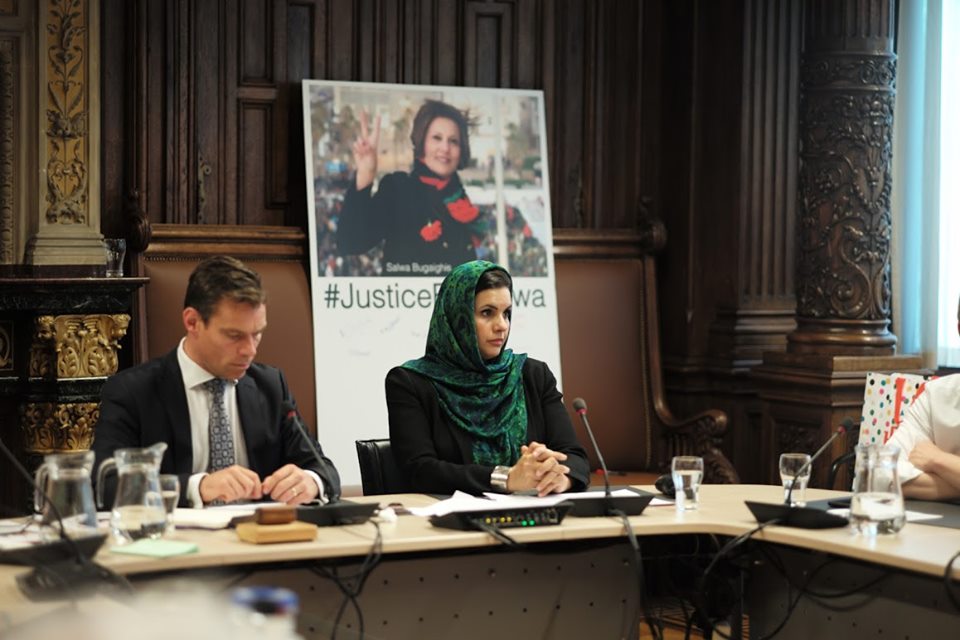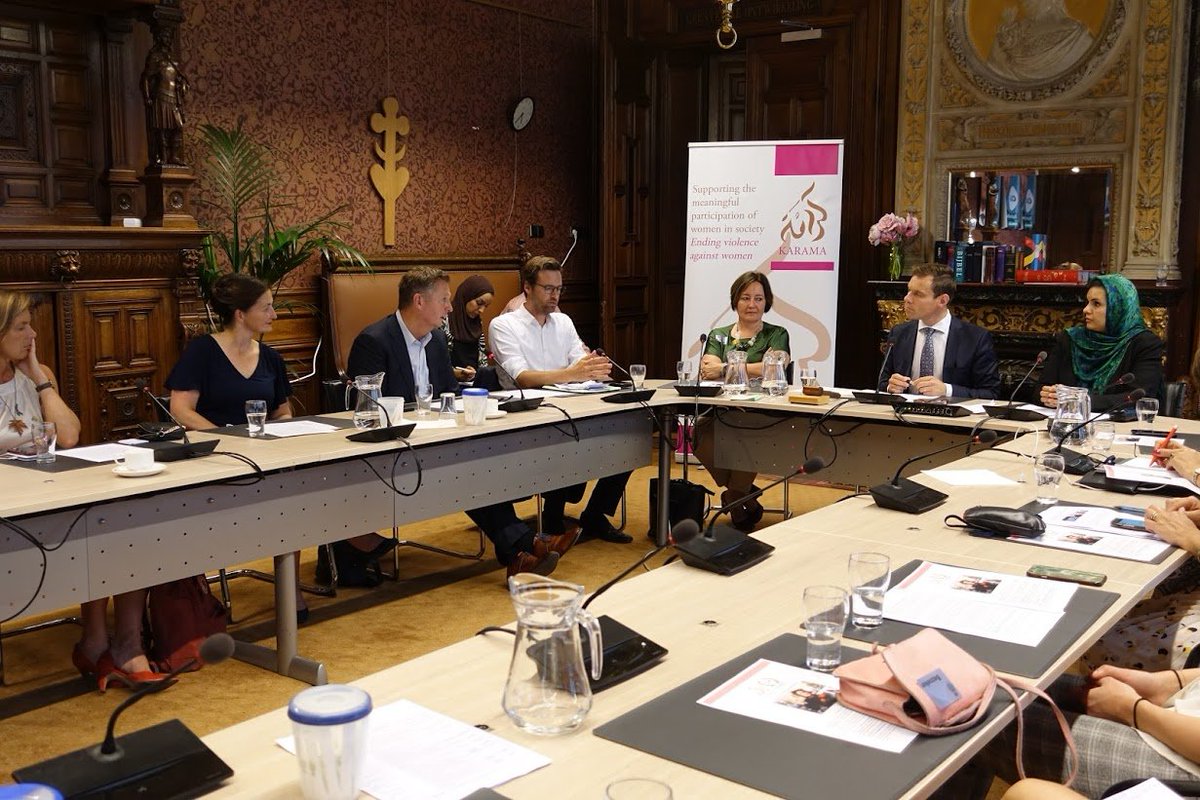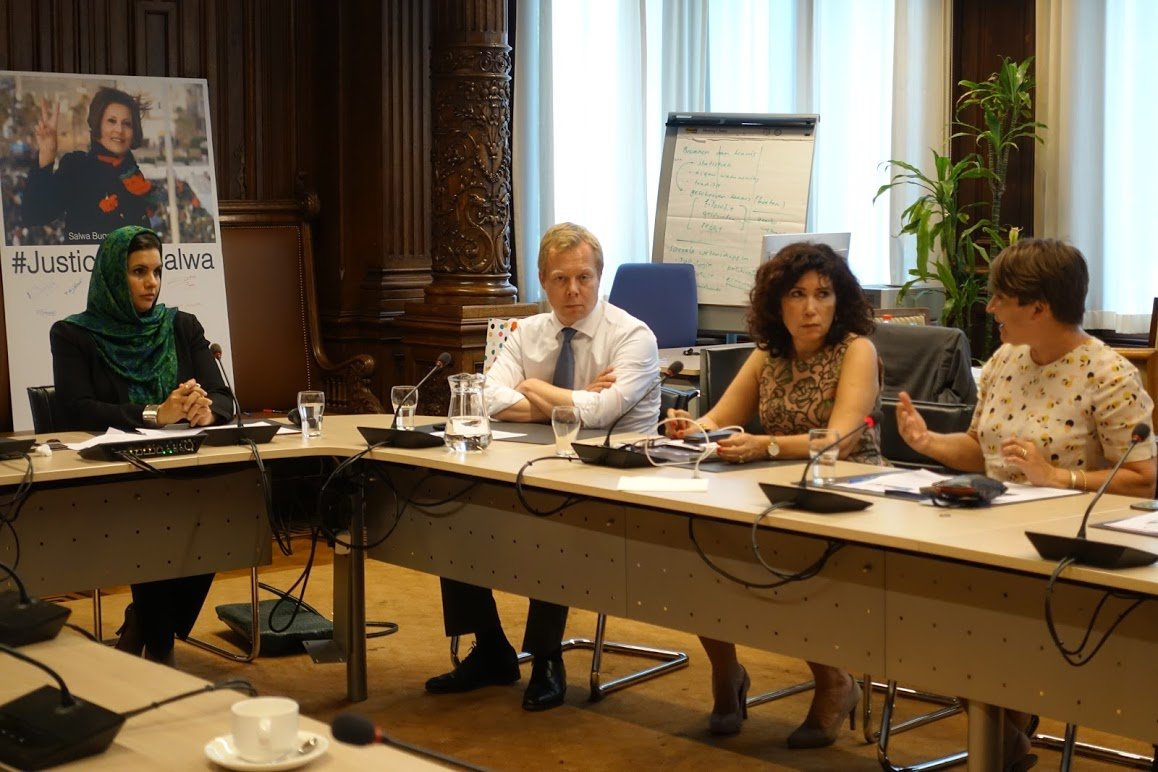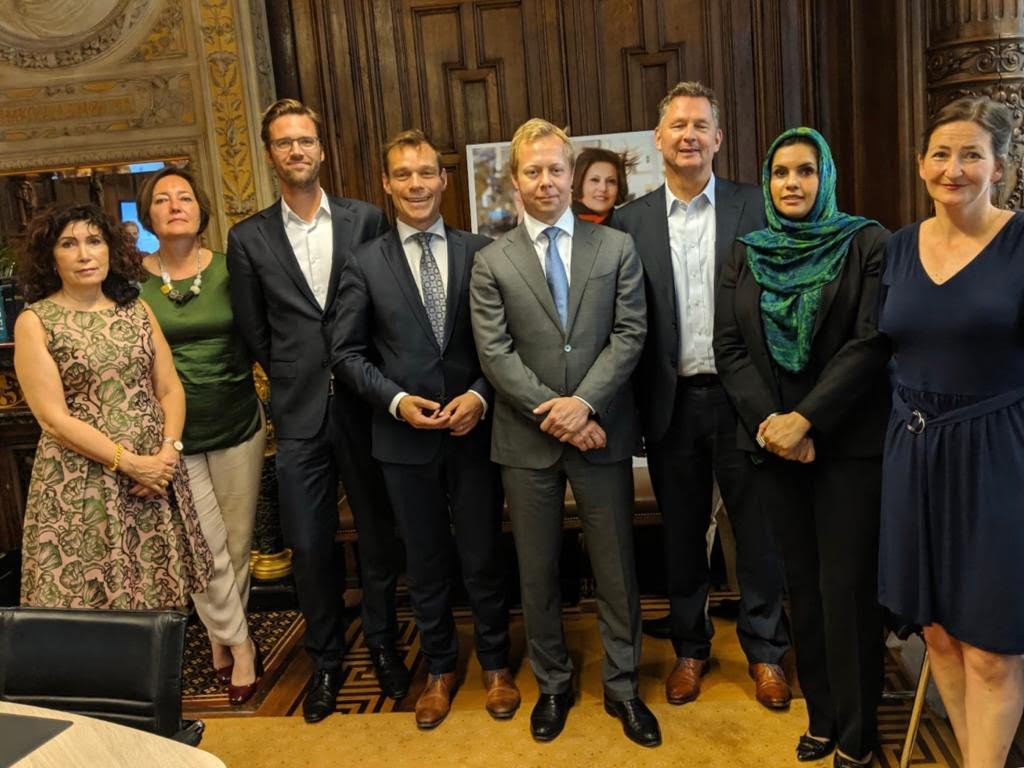بإحاطة منبر المرأة الليبية من أجل السلام .. البرلمان الهولندي يتخذ موقفًا حازمًا ضد الإفلات من العقاب في #ليبيا
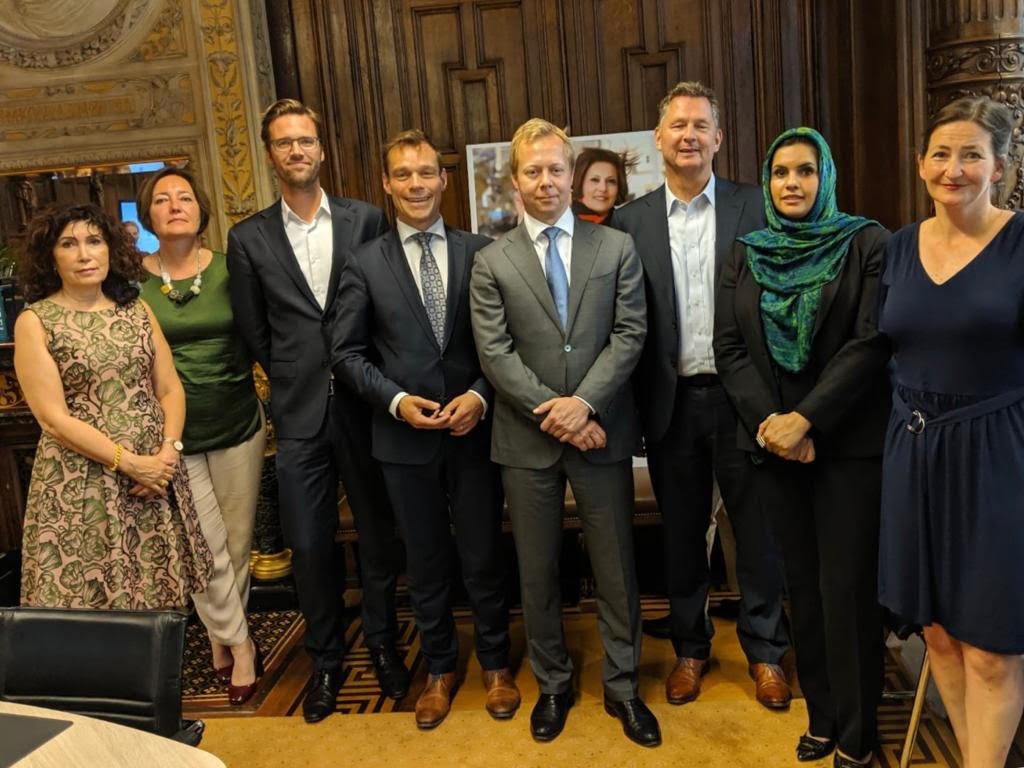
بإحاطة منبر المرأة الليبية من أجل السلام .. البرلمان الهولندي يتخذ موقفًا حازمًا ضد الإفلات من العقاب في #ليبيا
------
عقد البرلمان الهولندي الثلاثاء جلسة خاصة إحياء للذكرى الخامسة لاغتيال #سلوى_بوقعيقيص استمع خلالها إلى إحاطة من الزهراء لنقي، رئيسة المنبر حول حالة الإفلات من العقاب في ليبيا.
أكدت لنقي في إحاطتها على أن «ليبيا بحاجة إلى العدالة وليس مزيد من المبادرات السياسية الفضفاضة». ونوهت إلى أن «الملاحقات القضائية والمحاسبة الدولية يمكن أن تؤدي إلى وضع حد للإفلات من العقاب السائد في ليبيا». (نص الإحاطة كاملا بالأسفل)
وقالت الزهراء: «خمس سنوات بدون #العدالة_لسلوى، دون إجراء تحقيقات وملاحقات قضائية مناسبة لهذه الجريمة الرهيبة. في ذلك الوقت ، قلنا إنه إذا تعرض النشطاء والمدافعون عن حقوق الإنسان مثل سلوى للعدوان، فلن يشعر أحد بالأمان. وقد ثبت هذا بدقة مأساوية. تم استهداف النساء السياسيات والناشطات بشكل خاص لإسكاتهن. تعرضت نساء بارزات للمضايقة والاعتداء والاغتيال، مثل فريحة البركاوي وانتصار الحريسي، وغيرهن».
وشارك في الجلسة برلمانيون يمثلون أحزاب رئيسة وهم: سفين كوبمانز وأندريه بوسمان، من الحزب الليبرالي الحاكم (VVD)، سويرد سويردسما، من الليبراليون (66)، نيفين أوزوتوك (جروين لينكس) وليليان بلومان، من حزب العمل (PvdA)، جويل فوردويند وكريستين يونيني، من اتحاد المسيحيين، ومارتين فان هيلفيرت، من الحزب الديمقراطي المسيحي (CDA).
وعلق عضو البرلمان الهولندي، مارتين فان هيلفيرت، على الجلسة في تغريدة قائلا: «نحن البرلمانيين الهولنديون المجتمعين اليوم في ذكرى سلوى بوقيقيص، نقف متحدين ضد الإفلات من العقاب.» (https://bit.ly/2KEjJ86)
وفي مثل هذا اليوم، 25 يونيو 2014، اغتيلت المناضلة الحقوقية سلوي بوقعيقيص في منزلها من قبل مسلحين ملثمين، بعد لحظات بعد إدلائها بصوتها في الانتخابات البرلمانية.
وذكرت الزهراء لنقي بطلب هولندا في مجلس الأمن التحقيق في اغتيال سلوى، وأن يكون هذا التحقيق دوليا ومستقلا.
وطالبت لنقي المجتمع الدولي القيام بدوره «من خلال دعم ليبيا في الوفاء بالتزاماتها تجاه القرارين الإلزاميين 1970 و 2174 الصادرين عن مجلس الأمن. كما يقع على عاتق ليبيا واجب القضاء على الإفلات من العقاب، واحترام التزاماتها في مجال حقوق الإنسان وحمايتها والوفاء بها. ولا يمكن أن يكون هناك أي طريق للأمام من دون إقامة السلام والعدل أولا».
-----------------
نص إحاطة منبر المرأة الليبية من أجل السلام في جلسة البرلمان الهولندي حول إنهاء الإفلات من العقاب إحياء لذكرى سلوى
STATEMENT on the 25th June 2019 on the 5th commemoration of Salwa Bughaighis
Today we mark five years since the murder of our friend and colleague Salwa Bugaighis, who was assassinated on the day of parliamentary elections after casting her vote. Five years since one of the brightest lights for democracy and equality was extinguished.
Five years without #JusticeForSalwa, without a proper investigation and prosecutions for this terrible crime. At the time, we said that if activists and human rights defenders like Salwa faced aggression, then no one could feel safe. This was proved tragically accurate. Female politicians and activists were targeted specifically to silence them. Prominent women were harassed, attacked, and assassinated – including Fariha al-Berkawi, Intisar al-Harisi.
The militarisation of Libya’s conflict changed the equation, the once promising country for democracy. Failure to disarm, demobilise and reintegrate militias and armed groups meant the country never had a stable foundation from which to rebuild. As a result, warlordism has been empowered, making the assault on what we witness today on Tripoli by Khalifa Haftar an inevitability. Haftar launched his assault on Tripoli on the eve of the UN SECRETARY GENERAL’s visit, just a week before holding the Inclusive National Conference which the UN was supposed to facilitate. In just 7 weeks, the war has killed 739, injured more than 4,400, and displaced tens of thousands – not enough, apparently, to warrant a ceasefire demand from the UN security council.
For the past eight years, a cultural of warlordism and impunity has prevailed. It has not only derailed the democratic transition in Libya, but also caused the exclusion of women from decision-making. The factions’ willingness to use violence as a political tool has marginalised women, while the international community’s discourse on “women’s empowerment” has been tokenistic.” It is this culture of impunity and warlordism that killed Salwa and continues to haunt other brave women human rights defenders.
Can there be a role for the international community to end Libya’s turbulent transition more serious than its tokenism? YES! From the UN Security Council asserting the responsibility to protect in Libya, to the application of the “democratic toolkit”, to the continuing work of the United Nations mission. Many of the problems that Libya now faces stem from mistakes made at international level, so while the international community has a responsibility to Libya, it must be exercised carefully so that it does no further damage. We need to think creatively and bravely. We need to expand the responsibility to protect (R2P) to include responsibility to build (R2B) : build peace and justice for all. End the impunity culture.
Libya’s culture of impunity – as exemplified by the failure to prosecute the murders of high-profile women like Salwa, Fariha and Intisar – is something that the international community can usefully address. The International Criminal Court has an open investigation into Libya. The murders of women politicians and activists must be considered under their jurisdiction. Salwa was murdered as she returned home from voting in the last national elections to be held in Libya, hours after calling on friends and supporters to “fight peacefully by using your vote”. This was an assassination designed to strike at the heart of Libya’s developing democracy. The political motivations were absolutely clear.
Last year, the Netherlands used its seat on the UN Security Council to highlight Salwa’s case, noting that Impunity in Libya remains a grave problem.
International investigations, prosecutions and accountability can bring an end to the impunity that is reigning Libya which national institutions have collapsed after 2011 uprising and NATO military intervention. Libya’s transition would benefit from the international community’s support in establishing rule of law and ending impunity a lot more than from the tokenism of ‘political solution’ and ‘women’s empowerment.
There can be no empowerment of women if warlords continue to be empowered by the international community and are not held accountable.
There can be no sustainable peace in Libya if peace processes are centered around the appeasement of world lords and power sharing are only meant to be among these corrupt elite and warlords rather than an inclusive bottom up power sharing among people.
We thank the many politicians, policymakers and activists in the Netherlands who were pioneers as well as those around the world who have added their voice to the #JusticeForSalwa campaign over the last five years.
Salwa continues to inspire us. The best way to honor Salwa’s life is to fight for justice, equality, dignity, and inclusive peace across the region and across the world.
That must be her legacy.
-------
Zahra’ Langhi, Co-Founder & CEO of the Libyan Women’s Platform for Peace (#LWPP)
